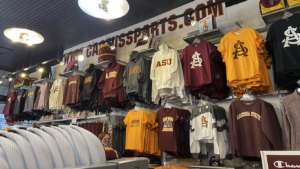HAT-TAC is one of Arizona State University’s Venture Devils program top start-ups, ranking in top 100 out of ASU’s hundreds of student-led ventures. It has sold over 200,000 of its products since its inception in 2017, not including 40,000 to Hat Club CEO Paul Stachel, who has retail stores across the country with seven stores in Arizona.
The HAT-TAC expansion will soon hit every baseball little league and every baseball stadium, if HAT-TAC CEO Dominic Fotino and his co-founders, Brent Hanke, chief operations officer, and Christian Joseph, chief technology officer, have their way.
Their sales for their product, a hat hanger designed to preserve the hats’ curve shape, was over $100,000 last year.
To think their company started because of a fight over a board game.
DON’T PASS AND COLLECT $200
Dominic was destined to be in the MLB. “I was supposed to be a pro baseball player,” Fotino said. His father, a long-time truck driver, wanted nothing less for him.
Dominic played the sport since he was five, joining little leagues until high school and then college. It came as a hard blow and surprise when Dominic’s father found out his son, who was on a baseball scholarship for New Mexico Highlands University (NMHU), was no longer enrolled.
The reason? A drunk quarrel between Fotino and his then-roommate over a game of Monopoly. Administrators and coaches found out and he was kicked out of school.
“I was so angry,” Fotino said, “baseball was everything I knew, I lived for it.”
It also did not help that his long-term relationship with his girlfriend, ended abruptly.
“I have not had a girlfriend since,” Fotino said.
A NEW PASSION
Angry and disappointed, Fotino wanted somewhere to release his anger. He luckily found martial arts, jiu-jitsu.
“That’s what made me do ju-Jitsu,” Fotino said, “It’s really cool.”
Fotino said the practice of the martial art helped him focus his frustration into constructive focus, and that led him to pursue his other lesser-known dream: to become an entrepreneur.
“I always knew I wanted to own a company,” Fotino said.
Fotino transferred to ASU’s W.P. Carey School of Business, where he developed a desire to be more hands-on in a business. He decided to switch programs and attend ASU’s Ira A. Fulton Schools of Engineering.
In August 2017, a professor gave Fotino an assignment to create a product, he created the HAT-TAC’s core design out of pressure to meet the deadline. He decided to further develop his project after a few classmates said they would buy it and went to seek guidance.
A NEW COACH AND A NEW TEAM
At ASU’s Polytechnic campus, Fotino found his friends and eventual co-founders, Brent Hanke and Christian Joseph. He also found his new coach.
“We didn’t really believe in Dominic,” Joseph said, “but when someone has something new, you usually don’t.”
“Listen, man,” Hanke interrupted, wanting to set the record straight, “Dominic was just all over the place, but he eventually convinced not just me, but everyone around him.”
Coaching came from veteran entrepreneur, Wayne Smith.
Smith, an ex-senior executive in the tech field, was a mentor at ASU’s Ventures Devils program. He is also the current CEO and owner of NextLevel UP, a strategic business developer for medium and small businesses.
“Wednesday with Wayne,” Hanke recalled.
“Yeah, we love Waynes,” said Joseph, “He’s an amazing person.”
Wayne has been part of ASU’s Venture Devils program for more than three years. He is a Venture Mentor, VM, who are hired by ASU to provide advice and consultation to ASU entrepreneurs, from customer discovery, business formatting, to pitching to investors for funding.
He told the young men to apply to the ASU’s idea pitch program, and became their second beloved mentor, every Wednesday at ASU’s polytechnic campus in Mesa, which Wayne did on top of his VM duties.
“I am not their mentor,” Wayne said, “these boys did all the work themselves. They just showed up every Wednesday and asked me on a design or business questions and then would return the next week with new improvements.”
Although he was not assigned directly with the HAT-TAC founders, according to them, he played a major role.
‘Wayne’s been our only true mentor,” Fotino said.
THE PITCH
That following semester, they pitched at ASU’s Pitch Playoffs and won $9,500. After that each founder invested $5,000 each, and distributed their share of the business, Fotino owns 35%, Hanke owns 34%, and Joseph owns. 31%.
“I really couldn’t have done this without them,” Fotino said.
Since then the men have worked from a garage, where they would spend countless nights manually creating each HAT-TAC, until they were able to afford to move to a new office in Tempe.
They have been awarded two patents for designs for HAT-TAC and have trademarked the name. Through ASU networking, the have three interns helping them maintain their business.
“Yeah, I wouldn’t change it,” Fotino said looking back, “it helped me be who I am.”
RECONCILIATION
Fotino said that communication with his family is minimal, including his baseball-loving father, but that he prefers it that way.
“My family is dealing with a lot of stuff,” Fotino said. He considers it a mutual benefit he is not a worry for his parents, but said he would like to see his mother, who he has not seen in years.
STEADY GROWTH
The secret to HAT-TAC’s steady flow of growth and income: diversification.
The men run three different selling websites. One is an e-commerce “drop shipping” Shopify website, amazon, and through affiliate marketing on other businesses that sell hats like an include an affiliate link to HAT-TAC, sharing a percentage of the sales.
The biggest revenue is Amazon.
“We know how to sell on Amazon,” Fotino said, noting not many small businesses sell their own products on Amazon.
“People are always amazed when I tell them HAT-TAC is on Amazon,” Hanke said, “’How did you get on Amazon?’ Same way you do anything, you just have to figure it out.”
Fotino wants to eventually move away from Amazon because he fears Amazon’s takeover.
“Amazon knows everything,” Fotino said, “they own your customer, they own their information, they know how much you sell, they take a portion of your cuts.”
“If you start selling enough, Amazon will be like “we’re going to take that.”
“It’s called Amazon Basics,” Joseph said.
The men said Amazon is still a great opportunity. “That’s what keeps us alive,” said Joseph. “Amazon keeps us afloat,” Hanke said, “but we know the winners are baseball.”
THE FUTURE BUSINESS PLAN
Their big shark is Woodinville, Washington-based Bensussen Deutsch & Associates (BDA).
“We partnered with a company called BDA,” said Hanke, “they own the exclusive rights for the MLB for gameday giveaways.”
BDA is the country’s top brand merchandising company, creating products for big names like Sony Pictures Entertainment, Coca-Cola, the NFL and of course the MLB.
“Diamondbacks, Dodgers, Yankees, they each on average have seven gameday giveaways a year,” Hanke said, “and each one of those giveaways is 20,000 to 40,000 units.”
“That’s Amazon on steroids,” Fotino said.
“They requested samples of every single team and over the next two-three months is when they make their decision,” said Hanke, “we have a huge opportunity.”
Another opportunity, HAT-TAC hired a regional sales representative for little leagues who sales hats to teams in Wyoming, Nevada, New Mexico, Arizona and Colorado. They pay him 20% commission for every HAT-TAC he sells to teams.
The men plan to influence the way little leagues make memories.
“That’s the goal,” Hanke said, “every kid should get a jersey, a hat, and a HAT-TAC. Every year. That’s a big avenue that we are pushing.”
MULTIPLE MODES OF INCOME
The men have also diversified their income streams by performing web development and advertisement for other businesses, like real estate, smoke shops, jiu-jitsu, drones, health, and land surveying companies.
“We do a lot of web design,” Fotino said. “And the advertisement for them.”
The HAT-TAC machinery is also used when orders are slow to create other business services for customers that need custom vinyl prints and banners. They also use it for their side business with another entrepreneur who had the idea to create and sell custom vinyl designed stickers for Nerf toy guns.
THE PERSONAL LIFE
When they have spare time, the men focus on part-time jobs and school.
“I bartend on the weekends at Blanco Tacos and Tequila,” Hanke said, “So not only do I slang HAT-TACs, I slang margaritas.”
“He’s also a rapper,” interjects Joseph.
Hanke said he enjoys well-off customers questioning his business because it allows him to practice his sales pitch.
“Most of them are financial advisors or something,” Hanke said, “they say ‘how many people wear hats? You think that old lady over there is going to buy a HAT-TAC?”
“It’s entertaining for me because I know my numbers,” said Hanke. “It’s a $20 billion business and 10% of it is hats. That’s more than $2 billion.”
Fotino spends most of his time dealing with the web design side business, teaching jiu-jitsu and working as a maintenance guy at a local elementary school.
“Yeah, ‘janitor’ doesn’t sound so flashy,” Fotino said.
“I go to school,” Joseph said, who is pursuing a degree in technology entrepreneurship and business management from Ira A. Fulton Schools of Engineering at ASU and is the youngest of the group.
He said he hates it because he is already doing what he loves: creating tech to solve real business solutions.
AN EXIT PLAN?
As for investors, according to the men, it is just a matter of experience and appreciation. Time.
‘I don’t know how much we are allowed to talk about it,” Fotino said looking at Hanke.
“We’re OK selling part of our share,” Hanke said, “but not right now.”
Both founders said they have had million-dollar offers in the past, but are holding off.
“It depends,” said Fotino. He plans to get a response for licensing and order deals with the MLB through BDA first.
Until then, Hanke said they hope to keep growing, making social media content for brand awareness, and “ride the wave.”
Fotino said he wants to make sure that whoever they deal with to do business, care as much for HAT-TAC as they do, and to make it in U.S.
“But at some point, when we get big,” said Fotino, “Yeah, we’ll sell out.”



